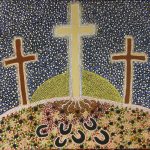Who do you say that I am?
16 September 2018
“Who do you say that I am?”
Peter answered, “You are the Messiah.”
We hear again Peter’s confession that Jesus is the Christ. I sometimes think that Peter is like Grasshopper in the 1970s TV series Kung Fu, a disciple who is attentive to his Master, but still makes mistakes. Peter stumbles many times, many times failing to understand what Jesus is saying and who Jesus is. I did read once the view of one commentator that Simon was called the Rock, which is what Petra means in Latin—not because he was the foundation of the Church but because he was particularly dull-witted, one who comes unstuck and falls. Perhaps so.
But now Simon called the Rock gets it nearly right. “You are the Messiah,” he says. Still he doesn’t see with 20-20 vision: what sort of Messiah is Jesus?
That he still cannot see.
We are so used to speaking of Jesus as the Messiah, as the Christ, that we can forget what messiahship was in ancient Israel.
Many in Israel were waiting for a liberator. They were occupied territory, a people under Roman rule, under Caesar; and it appears that even the religious elites who served in the Temple gave allegiance to Herod, the Roman governor. In a time of crisis, many looked for a king, a liberator like David of old, a shepherd king who would lead out his people Israel.
We say Messiah, but we might just as well say Christ. Christos means anointed one. All the kings of Israel had been anointed with oil. Think of David, who was tending the sheep when he was called suddenly to his anointing. Samuel took a horn of oil, anointing him king in the presence of his brothers and, we hear, from that day on the Spirit of the Lord came powerfully to rest upon David. To long for the Christ was to long for a great king, an Anointed One who would triumph unmistakeably over the rulers of the world.
You are this Anointed One, says Peter. 
What he did not expect—what he could not understand—is Jesus’ saying that the Son of Man must suffer many things and be rejected by the chief priests and the teachers of the law, and that he must be killed and after three days rise again.
Where are Jesus’ armies, where are his legions? What liberation is this? Peter is dismayed, and he confronts Jesus.
Peter cannot understand, yet, that Jesus will radically reinterpret what it means to be the Anointed One.
He will not be a military leader; he will not be another David who slays Goliath with a slingshot. Jesus will conquer not by force of arms, but by the force of martyrdom. A martyr is a righteous one who does not waver even to death and who, by his death, shakes the world. A martyr overcomes evil not by strength of arms, not by violence, but by the force of truth. Maybe we can find some analogy for Jesus’ power in the way of Mahatma Gandhi last century.
It’s by non-violence that Jesus will overthrow the powers of the earth. He is the non-violent Messiah; the king who will ride into Jerusalem on a young donkey. It might have seemed almost a joke of a Messiah—but the joke is on us.
Jesus draws upon the prophetic tradition of non-violence. He will go a Suffering Servant. You will remember the famous passage from Isaiah: “so will many nations be amazed at him, and kings will shut their mouths because of him.” He was “despised and rejected by men, a man of sorrows and acquainted with grief.” “Surely he has borne our griefs and carried our sorrows.” “The chastisement for our peace was upon him, and by his stripes we are healed.”
This is his kingship, his Christhood.
Perhaps we can say that Jesus will be even like the prophet Jonah, who is thrown overboard into the deep, dark sea, and is in the belly of the fish three days and three nights. He will be thrown overboard, a sacrifice to God.
So it must be also for those who come after him. His disciples will be thrown overboard into the deep waters, into the waters of martyrdom—not Peter and James and John only, but all his disciples through the centuries. We live into Jesus’ martyrdom, sinking down into the waters of rebirth, witnessing against the powers of the world and all violence. So we become new people.
This is the liberation Christ brought.
And his revolution goes on still—sometimes openly, sometimes hiddenly, through the long course of history. His is the long struggle of humanity against the powers of the world, which would twist and distort.
Who do you say that I am?
— You are the Messiah.
May we all have eyes to see more clearly who Jesus is, for each of us and for the world.
Amen.

